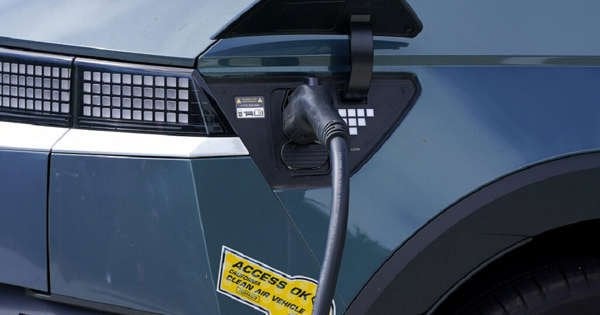California's Exclusive EV Mandate Under Fire From Automakers

Table of Contents
Automakers' Key Arguments Against California's EV Mandate
The automotive industry is pushing back against California's ambitious timeline, citing several key challenges.
Concerns about Production Capacity and Infrastructure
Automakers argue that the current infrastructure is insufficient to support the rapid transition to electric vehicles. They point to several critical bottlenecks:
- Limited Battery Production: The production capacity for EV batteries simply cannot meet the demand required to achieve California's aggressive targets. Securing the necessary raw materials, such as lithium and cobalt, also presents significant challenges.
- Inadequate Charging Infrastructure: While the number of charging stations is growing, many areas, particularly rural regions, lack sufficient infrastructure to support widespread EV adoption. This "range anxiety" remains a major barrier for potential EV buyers.
- Supply Chain Disruptions: The global supply chain continues to face disruptions, impacting the availability of crucial components for EV production.
Statements from major automakers like Ford and General Motors reflect these concerns. They've publicly stated that reaching California's targets within the proposed timeframe is unrealistic given current production capabilities and the complexities of the global supply chain.
Economic Feasibility and Consumer Demand
The automakers also raise concerns about the economic viability of a rapid transition to EVs. Key arguments include:
- High EV Prices: The price of EVs remains significantly higher than comparable gasoline-powered vehicles, placing them out of reach for many consumers. This affordability issue needs to be addressed before widespread adoption can be expected.
- Uncertain Consumer Demand: While EV sales are increasing, it is unclear whether current consumer demand justifies such a rapid phase-out of gasoline vehicles. A more gradual transition might be a more economically sustainable approach.
- Potential Job Losses: A swift shift to EVs could lead to job losses in traditional automotive manufacturing and related industries, requiring significant retraining and workforce adjustments.
Technological Challenges and Battery Innovation
Current battery technology presents significant hurdles to widespread EV adoption.
- Range Anxiety: The limited driving range of many EVs compared to gasoline cars remains a significant concern for consumers.
- Charging Times: Long charging times, particularly for some battery chemistries, are another deterrent to wider EV adoption.
- Battery Lifespan and Degradation: The longevity and performance degradation of EV batteries over time require further technological advancements. Improvements in battery density and charging speeds are also crucial.
California's Response and the Potential Implications
California defends its ambitious EV mandate, citing critical environmental and economic benefits.
California's Defense of its EV Mandate
The state argues that its aggressive targets are necessary to combat climate change and improve air quality.
- Environmental Benefits: The transition to EVs is crucial for reducing greenhouse gas emissions and improving public health.
- Economic Incentives: California offers various incentives, such as tax credits and rebates, to encourage EV adoption. These programs aim to make EVs more affordable and accessible to consumers.
- Technological Leadership: The state aims to position itself as a leader in the development and adoption of clean transportation technologies.
The Wider Impact on the US Auto Industry and Beyond
California's mandate has broader implications for the US auto industry and beyond.
- Domino Effect on Other States: Other states may follow California's lead, creating a national shift towards stricter EV regulations.
- Global Automotive Market: The California mandate will influence the global automotive market, accelerating the transition to EVs worldwide.
- Federal Regulations: The Biden administration's focus on EVs aligns with California's goals, though the specifics of federal regulations might differ.
Conclusion: The Future of California's EV Mandate and the Road Ahead
The debate surrounding California's EV mandate highlights the complexities of transitioning to a cleaner transportation future. While the environmental benefits are undeniable, significant challenges regarding production capacity, infrastructure, consumer affordability, and technological advancements remain. The ongoing conflict between automakers and California underscores the need for a balanced approach that addresses both the urgency of climate action and the practical realities of the automotive industry. Stay informed about the evolving debate surrounding California's EV mandate and its impact on the future of transportation. The success of this ambitious policy will significantly shape the future of electric vehicles and the broader automotive industry not only in California, but nationwide and globally.

Featured Posts
-
 Top 7 Irish Sci Fi Movies That Rival Hollywood
May 19, 2025
Top 7 Irish Sci Fi Movies That Rival Hollywood
May 19, 2025 -
 Burns Vs Morales Ufc Vegas 106 Fight Card Date Time And Venue
May 19, 2025
Burns Vs Morales Ufc Vegas 106 Fight Card Date Time And Venue
May 19, 2025 -
 Kuzey Kibris Gastronomisi Itb Berlin De Basariyla Temsil Edildi
May 19, 2025
Kuzey Kibris Gastronomisi Itb Berlin De Basariyla Temsil Edildi
May 19, 2025 -
 Trump In Gazze Paylasimi Skandalin Ayrintilari Ve Ilgili Kisiler
May 19, 2025
Trump In Gazze Paylasimi Skandalin Ayrintilari Ve Ilgili Kisiler
May 19, 2025 -
 New Pickleball Courts Planned For Olive Branch Community Support Needed
May 19, 2025
New Pickleball Courts Planned For Olive Branch Community Support Needed
May 19, 2025
